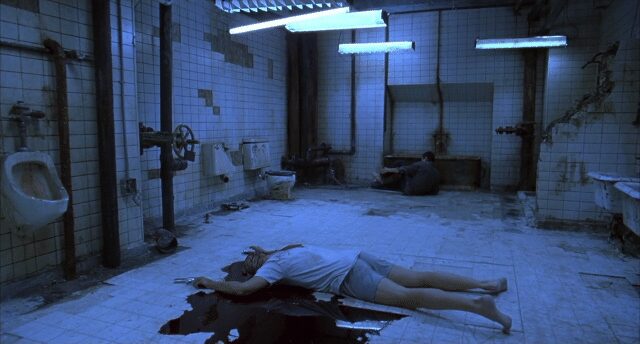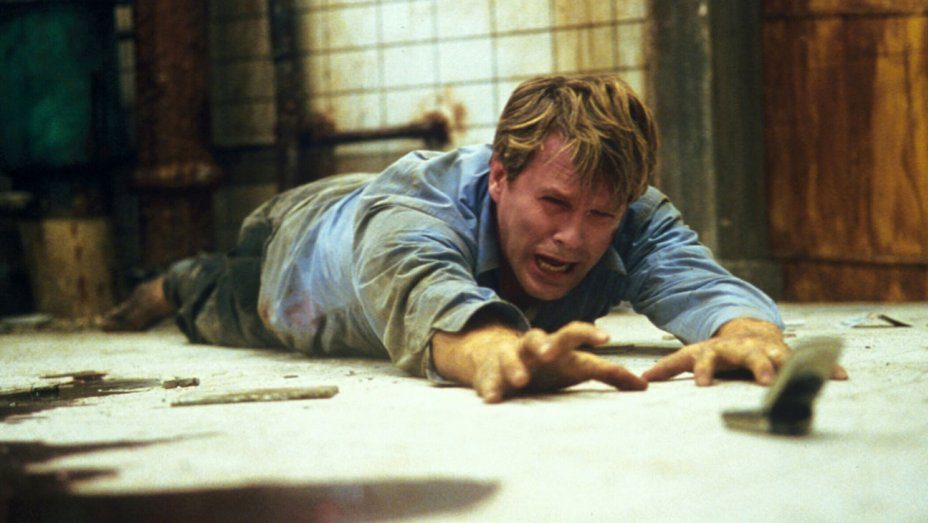“I want to play a game.”
It’s hard to think of a horror film with a more misbegotten legacy than that of Saw. It somewhat unfairly is looked upon as the forebearer of the regrettable “torture porn” genre; in its footsteps would follow its own increasingly grisly, convoluted sequels, as well as Eli Roth’s abysmal output; to say nothing of dreck like The House of 1,000 Corpses, Captivity, The Human Centipede trilogy, and so on. The difference between those films and Saw is that Saw was directed by an actual artist, James Wan. Although this is amateurish compared to Wan’s more accomplished works, like Insidious or The Conjuring, it at least has something on its mind beyond gore and viscera.
Two men wake up in a filthy bathroom. They are dazed and bewildered; worse than that, they’re chained to pipes. They have no idea why they’re being held captive, nor do they know each other. All they know is that there is no conceivable way out. It’s a killer premise, and Saw‘s best scenes are the ones in the bathroom, with only Lawrence (Cary Elwes) and Adam (Leigh Whannell, who also wrote the script) interacting with each other. Throughout the film, they cycle between resentment, despair, accusations, and fury. It’s evident that Wan and Whannell are making the most of their shoestring budget. They challenged themselves to make a film that only took place in one room, and you can tell how much fun they have in this derelict prison.

It’s when Saw leaves the bathroom that the film falters most. These are the scenes where the narrative gets convoluted and doubles back on itself; plot threads are introduced and not given any satisfactory resolution, and with the arrival of more and more characters, the thing that makes Saw work – its stiflingly claustrophobic atmosphere – gets diluted. Nowhere is this more evident than in the subplot concerning Detective Tapp (Danny Glover), who is on the trail of the Jigsaw Killer, and likes Lawrence as a suspect. Beyond being almost comically inept, Tapp doesn’t ultimately affect the storyline at all. Besides that, Glover is pretty hammy in the role. One wonders what drew him to the part of Tapp; there’s nothing about the character that demands he be played by an actor like Glover.
That’s not to say that Elwes or Whannell fare any better. For much of Saw‘s running time, both turn in community theater-grade performances, which it pains me to say as a fan of both actors (Whannell pops up in smaller roles in some of Wan’s other films, and he’s a lot of fun). Any sense of intimacy gets lost the louder each man yells. To be fair, in the film’s closing minutes, both actors reach a level of intensity that really sells the horrible situation they’re in. Whannell especially excels here, pleading “I don’t want to die” over and over until it becomes genuinely heartbreaking.

Saw sets itself up neatly for a sequel, with the killer rising dramatically from the ground, having disguised himself as a dead body the entire time. It’s too bad that glut of sequels followed this. Chris Rock, of all people, is reportedly rebooting the franchise, and I sincerely hope that he embraces the locked-room conceit that allows the film to be as successful as it is – in small doses. Ultimately, this movie gets too caught up in its own world-building, at the expense of tension. There is a good movie to be found in here; it’s a shame that everything after it took away the wrong lessons.
That’s a wrap on 31 Days of Fright, folks! Did I miss a few? Of course I did! I set an insane task for myself. Man, that was stupid. But we had fun, didn’t we? I did. Well, most of the time I did. We’re taking this back to first principles next year. See you then! Happy Halloween!

